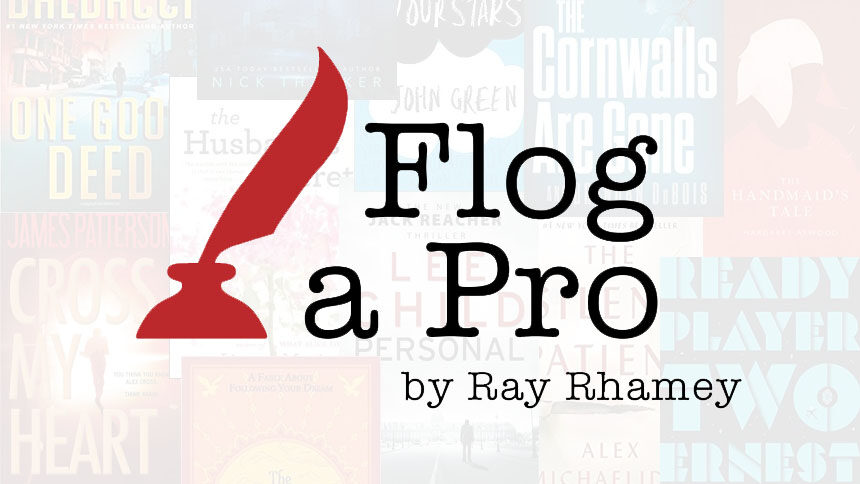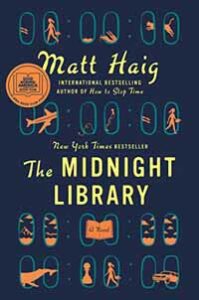Flog a Pro: Would You Turn the First Page of this Bestseller?
By Ray Rhamey | January 20, 2022 |

Trained by reading hundreds of submissions, editors and agents often make their read/not-read decision on the first page. In a customarily formatted book manuscript with chapters starting about 1/3 of the way down the page (double-spaced, 1-inch margins, 12-point type), there are 16 or 17 lines on the first page.
Here’s the question:
Would you pay good money to read the rest of the chapter? With 50 chapters in a book that costs $15, each chapter would be “worth” 30 cents.
So, before you read the excerpt, take 30 cents from your pocket or purse. When you’re done, decide what to do with those three dimes or the quarter and a nickel. It’s not much, but think of paying 30 cents for the rest of the chapter every time you sample a book’s first page. In a sense, time is money for a literary agent working her way through a raft of submissions, and she is spending that resource whenever she turns a page.
Please judge by storytelling quality, not by genre or content—some reject an opening page immediately because of genre, but that’s not a good-enough reason when the point is to analyze for storytelling strength.
How strong is the opening page of this novel—would it, all on its own, hook an agent if it was submitted by an unpublished writer?
Nineteen years before she decided to die, Nora Seed sat in the warmth of the small library at Hazeldene School in the town of Bedford. She sat at a low table staring at a chess board.
‘Nora dear, it’s natural to worry about your future,’ said the librarian, Mrs Elm, her eyes twinkling.
Mrs Elm made her first move. A knight hopping over the neat row of white pawns. ‘Of course, you’re going to be worried about the exams. But you could be anything you want to be, Nora. Think of all that possibility. It’s exciting.’
‘Yes. I suppose it is.’
‘A whole life in front of you.’
‘A whole life.’
‘You could do anything, live anywhere. Somewhere a bit less cold and wet.’
Nora pushed a pawn forward two spaces.
It was hard not to compare Mrs Elm to her mother, who treated Nora like a mistake in need of correction. For instance, when she was a baby her mother had been so worried Nora’s left ear stuck out more than her right that she’d used sticky tape to address the situation, then disguised it beneath a woollen bonnet.
‘I hate the cold and wet,’ added Mrs Elm, for emphasis. Mrs Elm had short grey hair and (snip)
You can turn the page and read more here. Kindle users can request a sample sent to their devices, and I’ve found this to be a great way to evaluate a narrative that is borderline on the first page and see if it’s worth my coin.
This novel was number two on the New York Times hardcover fiction bestseller list for January 23, 2022. Were the opening pages of the first chapter of The Midnight Library by Matt Haig compelling?
My vote: Yes.
 This book received 4.3 out of 5 stars on Amazon. Some agents say that voice is their number one criterion in evaluating submissions, and that’s the same for me much of the time. It can be the deciding factor when the tension level is on the fence.
This book received 4.3 out of 5 stars on Amazon. Some agents say that voice is their number one criterion in evaluating submissions, and that’s the same for me much of the time. It can be the deciding factor when the tension level is on the fence.
In addition to an appealing voice and crisp writing, the opening line was highly alluring bait on the hook. It raises story questions immediately. True, the narrative then slips into backstory, but the conversation is really about the theme of the novel, and it introduced someone who, for me, looks like a sympathetic character. So I’d give it another page or two to take root. (The next chapter opens with “Twenty-seven hours before she decided to die . . .” The rest of that chapter got me and I bought the book.) Your thoughts?
(Poll)
You’re invited to a flogging—your own You see here the insights fresh eyes bring to the performance of bestseller first pages, so why not do the same with the opening of your WIP? Submit your prologue/first chapter to my blog, Flogging the Quill, and I’ll give you my thoughts and even a little line editing if I see a need. And the readers of FtQ are good at offering constructive notes, too. Hope to see you there.
To submit, email your first chapter or prologue (or both) as an attachment to me, and let me know if it’s okay to use your first page and to post the complete chapter.
[coffee]










I voted yes. Voice and a good story question. I didn’t like the “For instance” at all. Would rather just hear the thing about her mother’s issue with the ear if there is to be backstory there at all. But I was definitely interested in reading more. When it comes to openings, voice is most important to me and I liked this one.
This opening is very deceptive. Yes, I would have read on, but now that I know what book we’re talking about, I’m pissed off… I know this is a sci-fi/fantasy novel and I don’t read those. I would have tossed the book the minute the fantasy elements came in. GRRR!
I voted no. Even though the first line was a good hook, and I admired the deft interweaving of dialogue and chess moves, as a whole the scene didn’t compel me. Also (although this has nothing to do with the quality of the writing), the scene looks very familiar. Has it appeared on Flogging before?
I don’t believe it has appeared here before. I found the cover image in my files, so I think I considered it a while back, but it isn’t in my files.
You did it in this column about 6 months ago: https://staging-writerunboxed.kinsta.cloud/2021/07/15/flog-a-pro-would-you-pay-to-turn-the-first-page-of-this-bestseller-67/
I found it really interesting that in your previous piece about this book (last year was a blur, so understandable it passed you by) you gave it a no and this time a yes. It has always interested me that books can resonate with us at different periods in our lives and according to our headspace. What is impenetrable or flat at one time can be a really satisfying read at another, which is echoed in your pieces and comments following both. For me, I would definitely turn the page. I recognised the book from the first line having read it some time ago but just going on the first page, I connected to the broken Nora and the warmth from Mrs Elm and wanted to know if Mrs Elm was her first step back.
Thanks, Ray. I must have seen it dissected elsewhere.
You know what’s funny, Anna? I had that same sense of having read this, or something very similar to it, before!
I’ve seen it before, too, and not because I’ve ever picked up the book.
I already have read that this second-chance-at-living novel and I can tell you that you have to give it a little time. It doesn’t start happy.
I stuck with it because of the strength and authority of the writing. Things like the taping down of the ear told me that this was not going to be an ordinary story. Both the librarian and the girl come alive instantly. This novelist knows what he’s doing, I thought, and so I read on and was rewarded.
Thanks, Don. I’m into reading it now, and it definitely gets pretty unhappy. I’ve turned that corner and wonder where this is going. It’s not easy reading at times, but still engaging.
My vote was a measured yes. Killer first line, but for me the writing went rapidly downhill from there.
But I’d hang in for a few more pages, and that opening you quoted from Chapter 2 would set the hook for me as well. The whole recurring “NNN_time before she decided to die…” construct is a winner for me.
I recognized it immediately. I’d started reading The Midnight Library after hearing all the hype. I got about a hundred pages in and just couldn’t do it anymore. There was so much potential, but it ended up being a shallow attempt at a self-help book. But in the spirit of the challenge, I reread the opening lines and based on them, voted yes.
I voted yes not because of the big story question of life/death/future but because of the details of the game and taping of the ear. I know I’m in good hands. Heading to the library today to get a copy. Thanks Ray.
I voted yes for about the same reasons you did, Ray. The first line was a great hook, and the character, sympathetic. It also clearly introduced the character of Mrs. Elm, and showed Nora’s dismay at everyone in her life (well, Mrs. Elm and Nora’s mother, so far) trying to “fix” her. The taping of the ear was a superb example of that. I loved that line. I was definitely intrigued and would continue reading.
A weak yes from me. The opening line, the story questions and the taped ear hint at a better hook to come. The rest of the chapter and the second would capture my attention.
I voted yes because the opening has enough intrigue, evocative language and character hints that I would move forward. However, I did finish the book about a month ago, and though I admired the structure of the book, and its imagination, I never felt actual emotional connection with Nora, and thus her entanglements, complex and interesting (and often painful), never touched me in the spot where I live.
I was a yes. The voice and thematic setup remind me of Fredrik Bachman who has the ability to say serious things in a deft and ultimately optimistic way. It’s fascinating how the one detail we all picked out–the taped ear–makes the character more sympathetic and known than the hook about her suicidality.
I too have run across this somewhere. I remember the taped ear and the chess game. Anyroad, I voted “no” because the choice as offered was stark: “dead to me” or “dying for more.” (!) If I were an imaginary first-reader, I probably would turn the page … just in case. But I was not gripped by the Elm and the seed.
I voted yes, although I wasn’t exactly dying to read it. The author did a good job of painting the characters in quick strokes of action and dialog. I wondered about the description of the chess game: were the moves simply to keep the scene moving, or was there something more revelatory in each character’s choices?
As someone else said, I voted a “measured” yes. Which is reassuring, because this book has been on my TBR list for a while, based on the overall description and reputation! The opening page isn’t making me feel as strongly as your poll option wording would suggest, haha — and is the “dying”/”dead” joke intentional? — but I did feel some intrigue, and importantly, I felt like I could trust the author further.